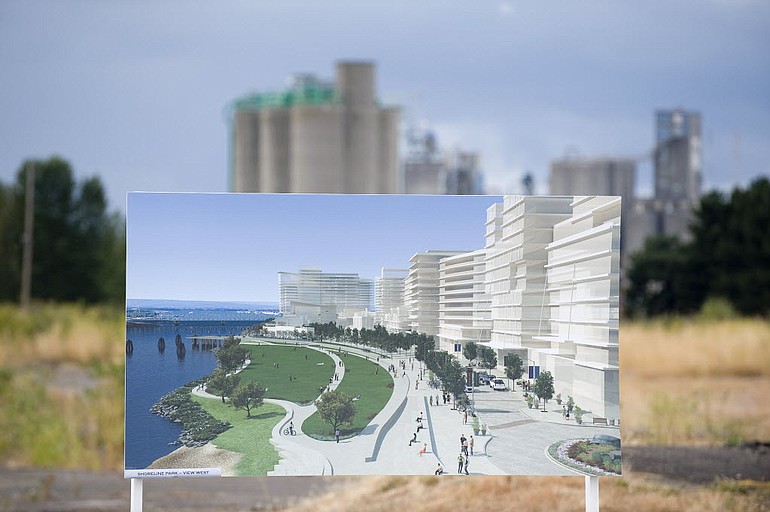Following difficulties with right-of-way access and tight railroad-construction windows, Vancouver’s $44 million waterfront access project is running a year behind schedule, city staff told the Vancouver City Council on Monday.
The delay — which included negotiations with the publisher of The Columbian for access on Grant Street — means the city council will have to approve changes to several agreements at its May 16 meeting.
Inked in 2009, the development agreement with Columbia Waterfront LLC — a group comprising Gramor Development of Tualatin, Ore., and its local investors — says construction work linking downtown to the waterfront must be substantially complete by the end of 2011, with full completion by mid-2012. Now, project timelines show the work being finished by early 2013.
However, Transportation Policy Director Thayer Rorabaugh said the city should still be able to honor its agreement to give developers construction access in time. “We promised access by a certain time, and we’re going to meet that,” he said.
In turn, however, Gramor has asked the city to defer its $350,000 payment to chip in on the public project this year. Developers agreed to pay $8 million of the waterfront access project, and that agreement has not changed, city Budget and Planning Manager Natasha Ramras said. But because the city is a year behind, they also asked the city council to amend the development agreement to put off their 2011 payment for one year. The group has already paid $1.15 million of that balance, she said.
The city had included that money in its 2011 capital budget, but Vancouver Business Development Manager Alisa Pyszka said “we can work with that within the budget.”
Barry Cain, president of Gramor Development, said at the access project’s groundbreaking in September 2010 that private development would begin in 2013. Columbia Waterfront LLC is already leasing and selling on the property, and investors expect to build mid-rise condominiums, offices, boutiques and restaurants worth an estimated $900 million on the 32-acre former industrial site.
Waterfront access plans call for re-opening Grant Street, which lies along the east side of the The Columbian’s offices at 701 W. Eighth St. and is currently closed to through traffic. Rorabaugh said Monday that is now set to happen in April 2013. The city paid Scott Campbell, publisher of The Columbian, $4.38 million for a building and Grant street access in September. However, that was too late for BNSF contractors to start work on moving a portion of the railway there last year, stalling the project.
Esther Street will also be put through the railroad berm to the waterfront, where a Boise-Cascade paper mill once stood. Work on Esther Street is expected to be mostly finished in October 2012.
Several places where trains cross roads will also be closed or rebuilt, meaning that train horn noise downtown should end in 2013.
The city council is also scheduled to begin a 25-year agreement with the state to use a form of tax-increment financing to pay for part of the construction of those roads. The city council already unanimously approved accepting up to $220,000 a year in state sales tax credit, that will pay for part of $3.1 million in construction bonds for the project. Ramras said the overall tax rate to residents will not increase. On May 16, the city council will vote on beginning the 25-year tax increment financing period and will then issue the bonds in June, she said.
The state tax-increment financing will also require a local match, which the city expects to pay with a part of its real estate excise taxes and the general fund. The city council already approved using up to $450,000 of excise tax money (which also goes to neighborhood traffic safety programs and debt service on the Marshall and Firstenburg centers) annually through 2013. Because of the one-year delay, staff said they will also ask the city council next week to extend the use of excise taxes for waterfront construction through 2015.
City Manager Eric Holmes said that nothing was new in the steps the city council will take next week and in the coming months.
“We’re following the script provided by state legislators,” said Holmes of the tax-increment financing ordinances, adding that the changes to the development agreement reflect normal delays major projects face. “We need to do a number of things to meet funding requirements. We’re taking care of business so we can honor our agreements in light of a one-year delay.”



